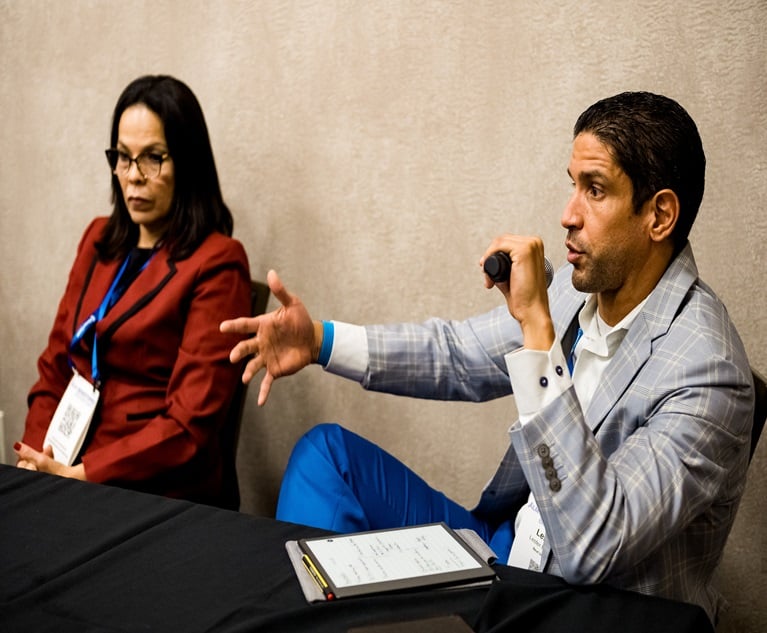 A crisiscan force individuals to look at a problem from a new perspective,providing fresh solutions and opportunities. (Photo: ALMArchives)
A crisiscan force individuals to look at a problem from a new perspective,providing fresh solutions and opportunities. (Photo: ALMArchives)
Consider that the word for 'crisis' in Chinese comprises twoChinese characters expressing the concepts of 'danger' and'opportunity.' This is especially appropriate today as insurancecarriers and claims professionals navigate new unknown concerns inthe wake of the COVID-19 pandemic.
|Financial markets are certainly in crisis from the stockmarket's steep decline, and for many Americans, this is becoming apersonal crisis as the hospitality and service areas shed jobsbecause of quarantines across the country.
|For the most part, adjusters and insurance professionals arefamiliar with seasonal downturns and surges. Catastrophic eventssuch as hurricanes, hailstorms, ice and floods bring additionallosses, and with them, a crunch for talent. Conversely, we seelulls based on good weather, economic downturns (when fewer peopletravel, there are fewer auto accidents) and other cycles.
|The claims environment post-COVID19 is uncharted territory asthe industry grapples with entirely new coverage questions.However, here are some quick thoughts from the perspective of a20-year claims veteran.
|Consider these five factors as we navigate the COVID-19crisis.
|1. Check your pending claims
Many adjusters I've been in touch with — both carrier and TPA —are working remotely from home but are seeing a downturn in newlosses. Now more than ever, many claimants may seek to conclude aging cases,which can give them a settlement at a time when they need it themost.
|This is a win-win for both parties, as adjusters have a windowof opportunity to give these more complicated cases a thoroughreview and claimants can reach the resolution that helps providesome financial peace of mind. Many of these issues can be handledby email, and with the post office still operating, businessshutdowns elsewhere have not hampered the ability to settle mostclaims.
|2. Pursue continuing education
Another complaint from many adjusters is the staggering amountof CE credits needed, usually around their birthday or even worse —during CAT season! Use this time to do those one-hour onlinecourses, sign up for vendor webinars and maybe even learn Xactimateor XactAnalysis. Knock out those 12-24 hours early on this year —you had to do it anyway!
|3. Consider starting an AIC, AIM or CPCUprogram
Similar to #2, many adjusters may use the opportunity to sharpen their skillswith additional designations in their field. Large caseloads canfrustrate even the most dedicated adjuster when trying to addcertifications to their skill set. Now is a unique opportunity formany to finally pursue that designation that not only adds to theirresume but brings an additional level of excellence to anyorganization for which they are working.
|4. Check files for subrogation andauditing
Downturns are excellent times to look for subrogation opportunities. Be sure to look atall of your open files for any possible contributing parties andfollow up on the notices sent on existing ones. Auditing files canbe done more easily at times like this, allowing management to seeif quality handling standards are consistent across adjusters.Bring in TPA or specialty adjusting firms to help move the morestubborn cases if needed. Follow up on those letters and make anextra call or two on outstanding exposures.
|5. Notice what works and what doesn't
One of the benefits of remote work is the fact that the patternsin place now will be useful in the future. People will still needto take vacations, have babies or take extended time off. Take thisopportunity to see which coworkers work naturally well together.What methods work best? Does your company do better with formalemails or is there an already well-oiled machine in place viatexting or Telegram when adjusters are covering one another andkeeping up morale? Do you see that Gayle and Sally cover welltogether and seem to have their own pacing in place? Watch whatworks and discard what doesn't. Already existing options developedfrom experience will make the transition much smoother the nexttime around.
|These are just a few observations that will hopefully inspireideas of how to best utilize this time. Unique opportunitiesrequire creative solutions — good luck on findingyours!
|Autumn-Skye Port, CPCU, AIC is the branchmanager for Peter J. Crosa & Co. in Atlanta, Georgia. Email herat [email protected].
|Related:
Want to continue reading?
Become a Free PropertyCasualty360 Digital Reader
Your access to unlimited PropertyCasualty360 content isn’t changing.
Once you are an ALM digital member, you’ll receive:
- All PropertyCasualty360.com news coverage, best practices, and in-depth analysis.
- Educational webcasts, resources from industry leaders, and informative newsletters.
- Other award-winning websites including BenefitsPRO.com and ThinkAdvisor.com.
Already have an account? Sign In
© 2024 ALM Global, LLC, All Rights Reserved. Request academic re-use from www.copyright.com. All other uses, submit a request to [email protected]. For more information visit Asset & Logo Licensing.








